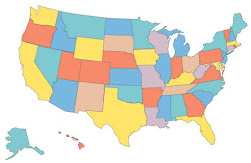Immediately prior to 1992, there were only five Black US House members from the South. As summarized by Wasserman, a 1986 US Supreme Court decision "interpreted Section 2 of the [Voting Rights Act or VRA] to require that majority-minority districts be drawn if a racial minority was both politically cohesive and sufficiently numerous to form a majority in one district." After these majority-minority districts were drawn for the 1992 elections, the number of Black House members from the South grew to 17. Some states, such as Virginia, had gone more than 100 years without a Black representative before 1992.
The Atlantic article refers to these districts with large numbers of African American voters as "hyper-minority" and "hyper-packed." These districts are also known as "VRA-protected" based on the Supreme Court decision, a term discussed in this earlier posting of mine.
These majority-Black districts have had an additional consequence, however, that Democrats (including most CBC members) are increasingly turning against. By packing Black voters into one district in a state, the surrounding districts were assigned larger percentages of White voters than before, which made these seats more Republican leaning.
Currently, several southern states' congressional delegations are all Republican except for one Democrat from a majority-Black district or at least one with a sizable Black population (Alabama 6-1 GOP; Kentucky 5-1; Louisiana 5-1; Mississippi 3-1; South Carolina 6-1). And as discussed in previous postings here, GOP legislators in Missouri and Tennessee are considering plans to reduce Democrats' representation from two down to one (VRA protected) seat.
Wasserman quotes several Democratic CBC members who are now championing an "unpacking" strategy in lawsuits to try to create two districts each in states such as Alabama, Louisiana, and South Carolina that would each have perhaps 40% Black voters and potentially be winnable by progressive candidates (Black or of a different race or ethnicity). Representative Terri Sewell (D-Alabama) notes that, while part of her wants to preserve her current district, "the need for another minority-opportunity district overrides that concern."





No comments:
Post a Comment